
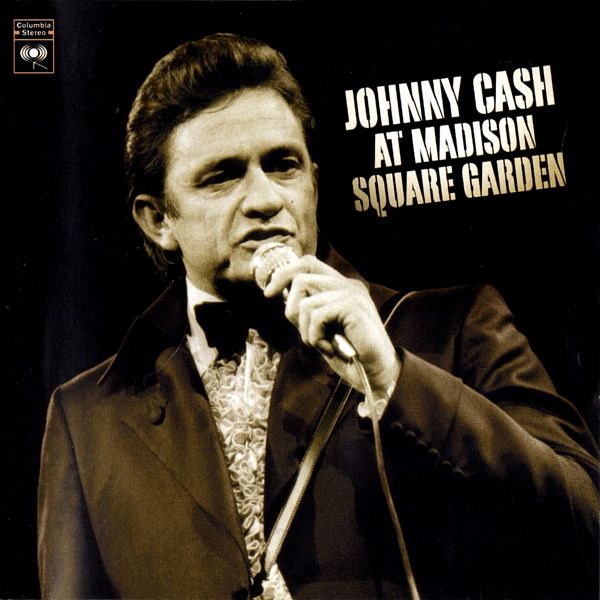 |

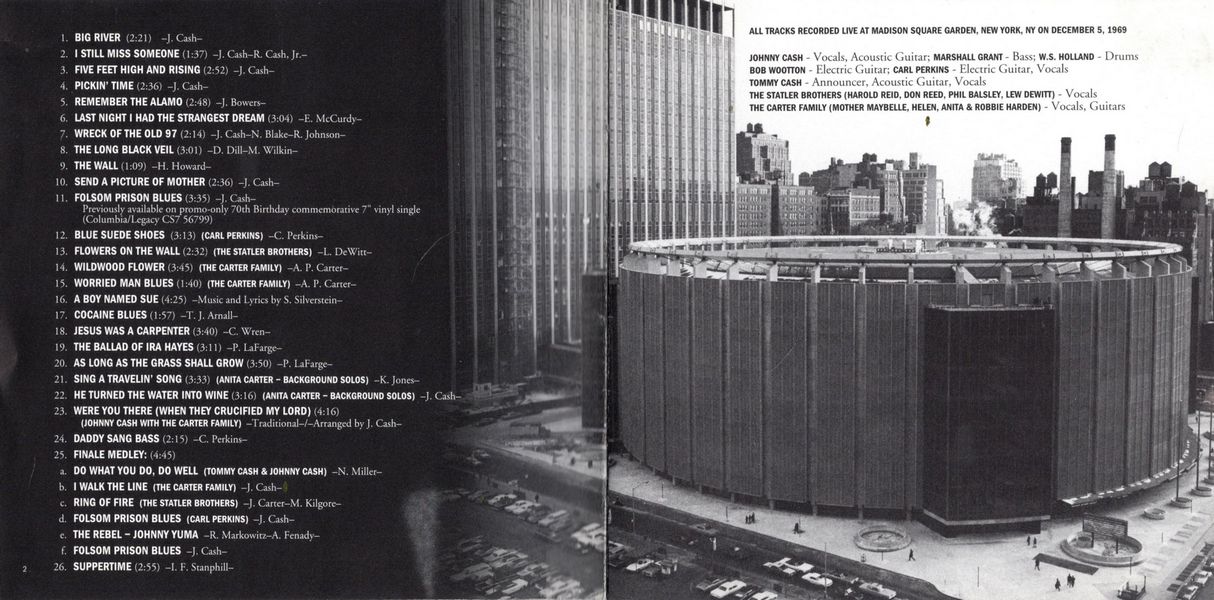
|
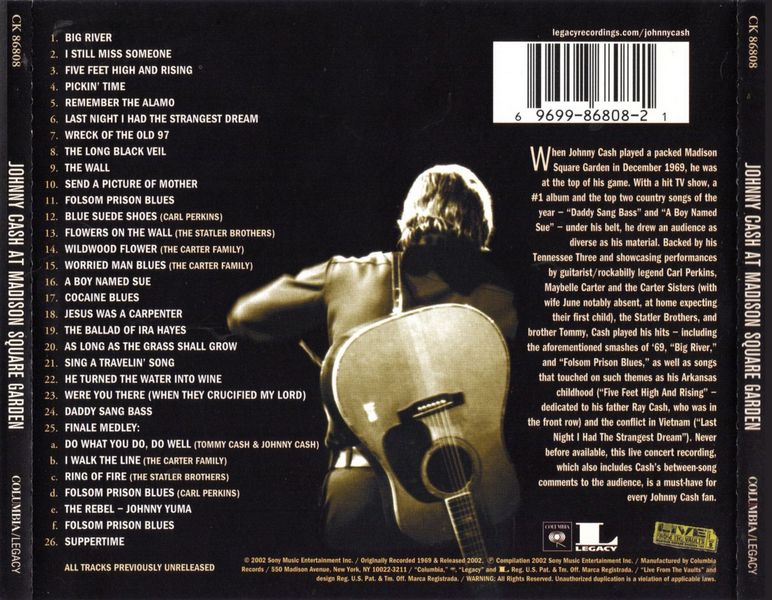
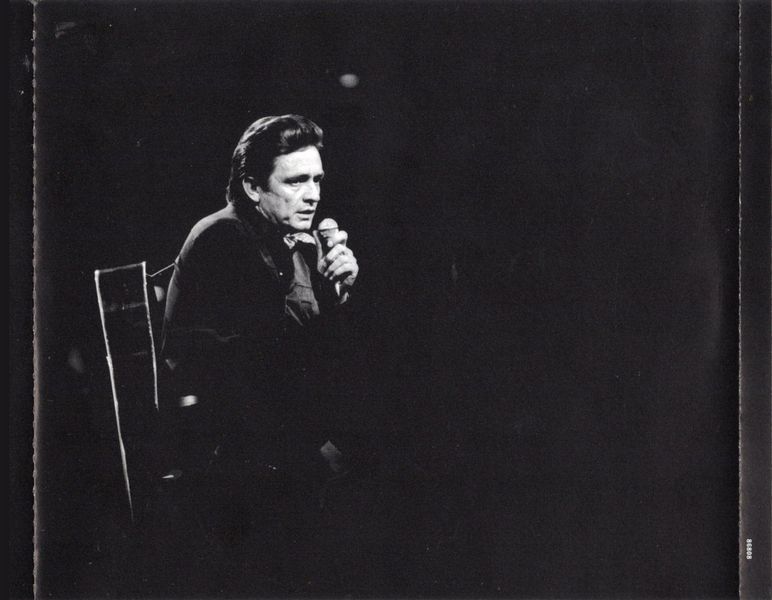
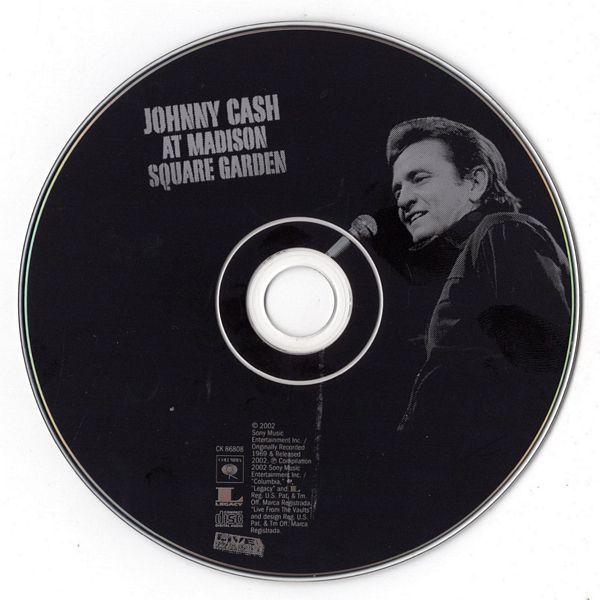 |
| more images |
Sleeve Notes
Promoting country shows in New York City was virtually unheard of in December of 1969, much less at Madison Square Garden. However, Johnny Cash had played a memorable concert at Carnegie Hall in October of 1968, so it seemed fitting to take this opportunity to promote Johnny's show at Madison Square Garden as the climax of our first year of irking with the Johnny Cash group, which included arranging the famous San Quentin Prison concert the previous February.
According to the official box office receipts, the Madison Square Garden concert played to an advance sellout capacity of 19,342 people.
The show was performed in the round on a stage that rotated, thus giving a much more intimate feeling to Johnny and his audience. During sound check the afternoon of the show, Johnny, Carl Perkins, The Statler Brothers and the Carter Family found the acoustics in the middle of the Garden with no audience to absorb some of the sound feedback quite unnerving. Fortunately, once the show began, these concerns disappeared as attested to by this album.
Johnny remarked as he left the stage that "it was almost like performing for friends in my living room." It seemed like the audience concurred.
It is a rare occasion when such a memorable event happens to be recorded for future enjoyment. This was one of those historic evenings. It was quite a contrast for the Cash show, which had performed in Mobile, Alabama three nights earlier.
Enjoy this milestone in the Johnny Cash worldwide musical odyssey that goes on and on.
Lou Robin & Allen Tinkley
Artist Consultants Productions. Inc.
July, 2002
Johnny Cash Live At Madison Square Garden 1969
by Holly George-Warren
"The Rough-Cut King Of Country Music" — that's what Life magazine called Johnny Cash on its June 21, 1969, cover featuring the Man in Black poised with his guitar, a smoking locomotive behind him. In the last year of the twentieth century's most tumultuous decade, the Arkansas-born singer-songwriter ruled the C&W charts. A pair of Cash hits — "Daddy Sang Bass" at Number One, followed by "A Boy Named Sue" — were the top two country songs of 1969, and his second live album recorded at a prison, Johnny Cash At San Quentin, staved at Number One for five months. (At Folsom Prison spent four weeks at Number One the previous year.) In 1969, Cash placed an unprecedented seven albums onto Billboard's Country & Western album chart.
Fourteen years after his first pop hit on Sun Records — 1955's primal "I Walk The Line" — Cash also had recaptured the imagination of the public at large. "A Boy Named Sue" had crossed over to land at Number Two on the pop chart, and the down-homey Johnny Cash Show, which had begun as a summer replacement TV program, had just been renewed by ABC for its 1970 season. (Cash had stood up to television execs who wanted the show to be filmed on a soundstage, insisting that if he couldn't do it at Nashville's Ryman Auditorium, which had been home to the Grand Ole Opry, then he wouldn't do the show at all. It remained at the Ryman.)
It's no wonder the audience at his record-breaking December 5, 1969, Madison Square Garden concert represented a cross-section of America, as described so colorfully by Post critic Al Aronowitz in his rave review.
It took a man as courageous, iconoclastic, outspoken, and talented as salt-of-the-earth Johnny Cash to win over a nation divided by war — the one being fought in Southeast Asia and the one waged at home over social, sexual, and lifestyle upheavals brought forth by the burgeoning counterculture. His booming, trademark greeting, "Hello, I'm Johnny Cash," communicated a warmth and camaraderie to long hairs, short hairs, even no hairs — like Shel Silverstein, composer of "Sue" sitting front row center that night at the Garden.
Six months earlier. Life had chosen Cash for its cover because the Arkansas native had sold over a million copies of "Sue" since its release in the spring. Earlier that year, "Daddy Sang Bass" had also hit Number One on the C&W chart, which was especially gratifying since it was written by Cash's longtime friend, Sun label mate, and fellow rockabilly architect Carl Perkins, who now toured with Cash's revue (and is spotlighted here performing his signature "Blue Suede Shoes"). "Daddy Sang Bass also featured Cash's vivacious wife June Carter and her family members — on record and, usually, on tour. Legendary Mother Maybellc Carter, along with June and her sisters, Anita and Helen, had been traveling with Cash for nearly a decade, but June had taken time off near the end of '69 since the Cashs' son, John Carter Cash, was due in March.
Perhaps the quality that most endeared Cash to the Garden audience that December night (which comes across on this powerful live recording), as well as the American mainstream, was — and is — his realness. Rather than a pose. Cash's down-to-earth demeanor and sociopolitical concerns are the real deal. A cinema verité documentary, Johnny Cash! The Man And His Music, filmed over several months in 1968 and 1969, depicted Cash on the road, gigging at a prison (doing "Folsom Prison Blues ") and on an Indian reservation (performing a moving "The Ballad Of Ira Hayes"), in the studio with his band, the Tennessee Three (drummer W.S. Holland, bassist Marshall Grant, and guitarist Bob Wootton, who replaced die late Luther Perkins), and cutting a song with his pal Bob Dylan. (Some of the Dylan-Cash collaborations would end up on Dylan's pastoral Nashville Skyline, for which Cash would pen liner notes.)
The film also documents Cash's support of struggling songwriters, as he listens in Oregon to a hillbilly picker doing a number comparing bis wife to a biscuit, and backstage another night Cash encourages a Dylan wannabe from Saskatoon. At Madison Square Carden, as we can hear, Cash makes a point of crediting his late nephew as the fourteen-year-old author of the folky "Sing A Traveling Song" and journalist Christopher Wren as the composer of "Jesus Was A Carpenter," along with his announcement of Silverstein's presence. The documentary film also found Cash and company back in his boyhood hometown of Dyess, Arkansas (the locale for "Big River," "Five Feet High And Rising," and "Pickin' Time"), walking through the empty house his family once lived in and shaking hands with former neighbors and the guy who ran the local gas station. It sounds as if these events were still fresh on Cash's mind as he described his youthful stomping grounds from the Garden stage.
In the 1970s, Cash's impact on the American psyche would continue to reverberate, as he campaigned for Native American rights and prison reform. That decade's most controversial and highly publicized inmate, Cary Gilmore, whose death wish coincided with the reinstatement of capital punishment in 1976, spoke on the phone with Cash, who sent him an autographed copy of his memoir, Man In Black (which, following his execution, Gilmore left to his mother, also a Cash fan). On the opposite end of the spectrum, Cash became a confidante of President Jimmy Carter that same year — a close relationship the two have maintained to this day.
More than a quarter of a century later, a new generation of fans — many of whom were not yet born in 1969 — have joined in the adulation of the seventy-year-old singer-songwriter and, thanks to this recording, can hear the Man in Black onstage. Just as Johnny Cash broke down barriers between people in the 1960s, he reaches an incredibly diverse audience in the first decade of the twenty-first century, as proven by the eclectic group of young artists participating in recent Cash tributes on television and on CD.
Perhaps at his peak in 1969 — playing a repertoire ranging from rockabilly to country to gospel to folk to blues — the then thirty-seven-year-old Cash's enthralling performance illustrates something he told me a few years ago: "When I'm in that studio or on that stage, [a fire] is coming out of me," Cash said in 1997. "That fire is just as bright and hot today as when I was twenty-three."
Rest assured, Mr. Cash, your music will continue to burn for all of us for many years to come.
"It was a magic night! The air was electric and felt good. The audience responded beautifully."
Johnny Cash
July, 2002